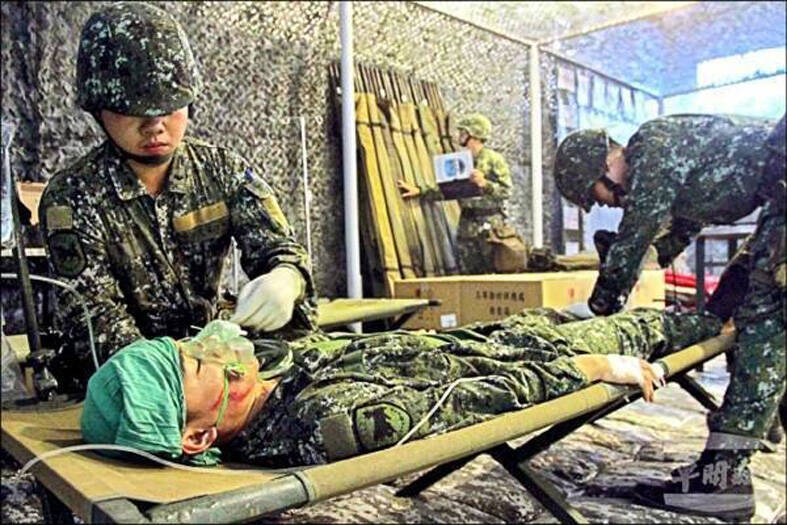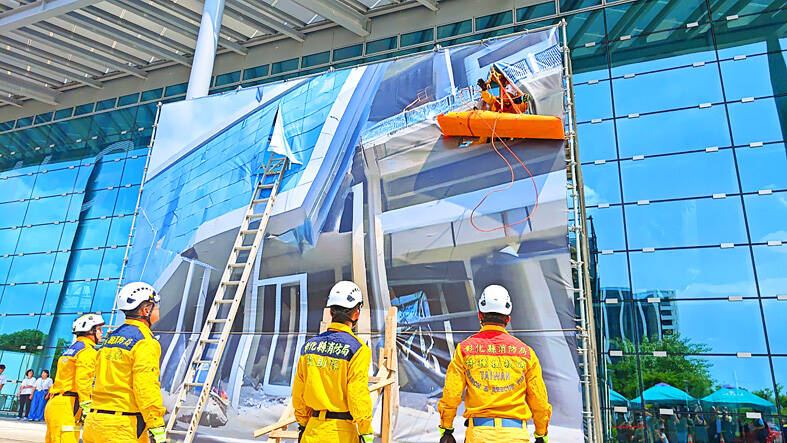The Ministry of National Defense (MND) yesterday detailed efforts to boost the nation’s wartime medical resilience, including a plan to set up a blood donation management unit.
Defense officials made the remarks in a report submitted to lawmakers ahead of Minister of National Defense Wellington Koo’s (顧立雄) question-and-answer session at the legislature’s Foreign Affairs and National Defense Committee today.
The ministry said it had made efforts to enhance the military’s stockpiles, equipment repair and maintenance, digital communications, and battlefield medicine capabilities.

Photo courtesy of the 8th Army Corps
The armed forces have also enhanced its communications with the Ministry of Health and Welfare, the National Fire Agency, county-level public health agencies and hospitals to create a wartime health system, it said.
The military last year conducted seven joint exercises with the civil government and private hospitals, and plans to hold seven more this year, it said.
The planned exercises would focus on certifying hospitals’ ability to stabilize the injured before their transfer to military care and send surgical units to the outlying islands, it said.

Photo: Chen Kuan-pei, Taipei Times
The armed forces by December would found a national blood donation unit, the first organization of its kind, and establish blood banks at hospitals in central, southern and eastern Taiwan, it said.
The MND said next year it would launch the tri-service blood program, a centralized blood supply system to standardize blood policy and operating procedures to secure blood supplies in wartime.
It said it bolstered medical services’ chemical, biological, radiological and nuclear warfare capabilities by certifying military hospitals in Kaohsiung and Hualien.
Military medical services would be able to provide basic care in case of chemical, biological or nuclear attacks anywhere in Taiwan, it said.
The MND and the Ministry of Health and Welfare in 2023 established a reserve capacity that could be activated to provide medical care to wounded military personnel and civilians during an armed conflict, it said.
Officials are creating mobilization plans for nurses and caregivers to deal with non-critically injured civilians at first aid stations across 300 townships, it said.
In other news, the Presidential Office’s Whole-of-Society Defense Resilience Committee said it is on Thursday next week to hold its first-ever field exercise in Tainan.
The exercise would test Taiwan’s capability to respond to a natural disaster that could severely damaging its infrastructure, such as an earthquake and tsunami, it said.
Cabinet officials, the Tainan City Government and the Presidential Office would participate in the exercise, it said.
The committee said its mission is to implement the policy of President William Lai’s administration to strengthen the nation’s resilience against threats posed by natural disasters and authoritarian expansionism.
Improving the coordination between central and local governments, and the private and public sectors is key to make Taiwan’s national defense, civil society, natural disaster response and democracy resilient, it said.
The committee said it would convene its third meeting and hold a news conference in Tainan after the exercise.
The exercise would feature simulations to evacuate people, provide shelter, and establish field hospitals and aid stations, Presidential Office spokeswoman Karen Kuo (郭雅慧) said.
The exercise would have components A and B, which would be conducted at Tainan’s Nanning High School and in front of Anping Harbor tourist information center, she said.

INVESTIGATION: The case is the latest instance of a DPP figure being implicated in an espionage network accused of allegedly leaking information to Chinese intelligence Democratic Progressive Party (DPP) member Ho Jen-chieh (何仁傑) was detained and held incommunicado yesterday on suspicion of spying for China during his tenure as assistant to then-minister of foreign affairs Joseph Wu (吳釗燮). The Taipei District Prosecutors’ Office said Ho was implicated during its investigation into alleged spying activities by former Presidential Office consultant Wu Shang-yu (吳尚雨). Prosecutors said there is reason to believe Ho breached the National Security Act (國家安全法) by leaking classified Ministry of Foreign Affairs information to Chinese intelligence. Following interrogation, prosecutors petitioned the Taipei District Court to detain Ho, citing concerns over potential collusion or tampering of evidence. The

‘FORM OF PROTEST’: The German Institute Taipei said it was ‘shocked’ to see Nazi symbolism used in connection with political aims as it condemned the incident Sung Chien-liang (宋建樑), who led efforts to recall Democratic Progressive Party (DPP) Legislator Lee Kun-cheng (李坤城), was released on bail of NT$80,000 yesterday amid an outcry over a Nazi armband he wore to questioning the night before. Sung arrived at the New Taipei City District Prosecutors’ Office for questioning in a recall petition forgery case on Tuesday night wearing a red armband bearing a swastika, carrying a copy of Adolf Hitler’s Mein Kampf and giving a Nazi salute. Sung left the building at 1:15am without the armband and apparently covering the book with a coat. This is a serious international scandal and Chinese

Seventy percent of middle and elementary schools now conduct English classes entirely in English, the Ministry of Education said, as it encourages schools nationwide to adopt this practice Minister of Education (MOE) Cheng Ying-yao (鄭英耀) is scheduled to present a report on the government’s bilingual education policy to the Legislative Yuan’s Education and Culture Committee today. The report would outline strategies aimed at expanding access to education, reducing regional disparities and improving talent cultivation. Implementation of bilingual education policies has varied across local governments, occasionally drawing public criticism. For example, some schools have required teachers of non-English subjects to pass English proficiency

NEGOTIATIONS: The US response to the countermeasures and plans Taiwan presented has been positive, including boosting procurement and investment, the president said Taiwan is included in the first group for trade negotiations with the US, President William Lai (賴清德) said yesterday, as he seeks to shield Taiwanese exporters from a 32 percent tariff. In Washington, US Trade Representative Jamieson Greer said in an interview on Fox News on Thursday that he would speak to his Taiwanese and Israeli counterparts yesterday about tariffs after holding a long discussion with the Vietnamese earlier. US President Donald Trump on Wednesday postponed punishing levies on multiple trade partners, including Taiwan, for three months after trillions of US dollars were wiped off global markets. He has maintained a 10 percent